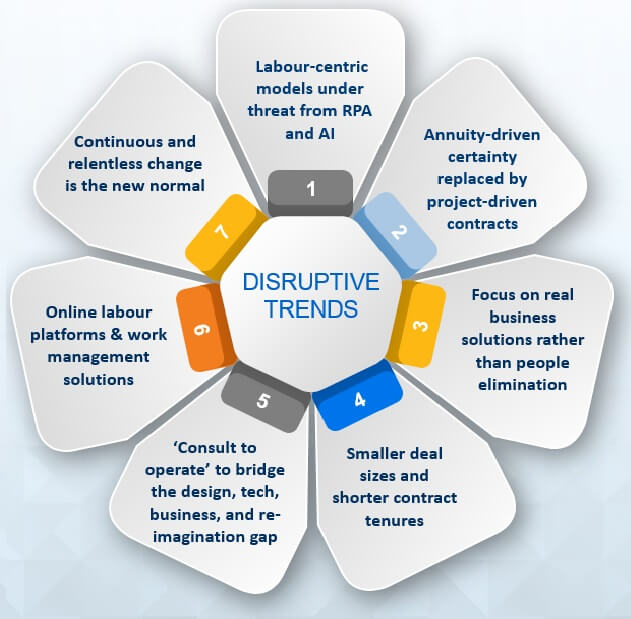Business Process Outsourcing industry has grown manifolds over the past two decades – driven by evolving technology, high level of innovation and aggressive competition.
Customer expectations too have changed over this period and the traditional outsourcing models have been overthrown by disruptions leading into a new age of disruptive outsourcing.
“Traditional outsourcing is dead… Long live disruptive outsourcing”
The outsourcing models have moved from non-core processes to more complex processes with technologies like Straight Through Processing (STP) platform solutions, RPA & AI-ML significantly influencing the business delivery models. Traditional outsourcing models focused more on the non-core, back-office processes utilizing client technology and platforms. Now, the new business model has dived deep into the core business processes with BPO owned solutions, standard platforms and outcome-driven approach.
Within Hexaware BPS, the focus is to leverage Technology and Domain Expertise to deliver value to clients going beyond cost arbitrage.

Process outsourcing has also moved into the second wave, where, most of the transitions are from incumbent vendors. This business requirement, along with the change in customer expectations business model, has led to a change in how we approach business transitions.
The traditional approach was to migrate technology and people, whereas “new age” transitions are driven by transformation, technology integration, innovative solution and higher collaborations between service partners and customers.
Customers expect a speedier transition with minimal disruption to their processes and overall business. These customer demands have impacted the transition approach and skills and competencies required in the transition team. Further, leveraging technology tools to deliver transitions seamlessly has become imperative to exceed customer expectations.

Based on the ever evolving business environment, technology improvements and client expectations, Hexaware BPS Transition team approach is also constantly evolving keeping pace with the change in technology and business environment. Some of the critical areas impacted in Transition Approach, Team and Technology are:
1. TRANSITION APPROACH
The key changes observed in Transition approach are – need for higher responsiveness, focus on business outcomes and seamless delivery of transformation initiatives along with transitions. These changes have resulted in the adoption of the following measures as a part of the transition approach:
-
Hybrid methodology for responsiveness
The need for more responsiveness during transitions has led to the adoption of a “hybrid” methodology of transition like iterative waterfall and agile. Agile methodology comes into play with a strong partnership between the customers and service partners, quick decision making, regular and structured governance in small teams to provide flexibility in a dynamic environment. The customer and service provider, both blend into cohesive teams to work side by side, in a virtual environment to deliver seamless Touchless Transitions and achieve their goals.
Hexaware’s transition methodology “TransX” provides a structured framework to drive transitions in a variety of business environments including in the current virtual environment using the hybrid approach.
-
Expertise Led Business Services – Consultative & design thinking approach
The transition approach has become more consultative, business outcome-driven and customer-centric. Hexaware BPS leveraging a mix of deep domain expertise and technology tools like process discovery tools to identify process transformation opportunities, and deliver transformation as a part of transitions. Domain Experts are aligned to identify optimal business processes at the inception of the transitions to identify transformation opportunities that impact client businesses beyond process being transitioned. Further, transition managers and functional consultants with domain understanding lead projects and interact with client stakeholders, in line with customer expectation.
-
Transition & transformation integration
Most of the outsourcing companies deliver on process transformations by automating processes to save on human effort and gain a higher level of accuracy. Hence, the process of transformation begins at a very early stage of the Transition. The traditional “lift and shift” model has evolved variants in the form of “Transform-lift-shift” or “Lift- transform and shift” models. This has led to tight integration of process transformation activities with transitions. This simultaneous delivery of transformation and transition requires transition teams to have a strong understanding of project management, domain and technology solutions that drive process transformations.
-
“Fusion Outsourcing” – future outlook?
Looking at the evolution of the outsourcing models in close integration with technology, the era of transition of people, process and BOTs has already begun. Remote working solutions like online work management solutions and labor-management platforms are the plausible future outlook of outsourcing. Online freelancing platforms are transforming work, organizations and business models. This could also impact the talent sourcing approach.
The transitions of the future possibly will have a fusion of all these approaches integrated into transition methodology.
2. TRANSITION TECHNOLOGY
Technology innovations have brought about disruption in the present wave of transitions and technology-driven transitions have become the need of the hour.
-
High degree of automation
Transitions are becoming more complex with the integration of technology in transition. This has placed increasing demands on the role of transition managers. Transition managers must leverage technology tools and project management platforms to manage the increasing complexity in transitions. Hexaware leverages tools to automate repetitive tasks in transition – like reporting, communication management with internal and external stakeholders and tracking of deliverables as a part of transition through customized tools. These tools are critical in ensuring that transition managers have end-to-end visibility of project progress and they can deliver transitions as per plans.
-
Technology-driven approach
Technology has become an integral part of the transitions and it plays a significant role in different phases of transition. The latest technology-driven tools like AI-ML driven process discovery and process mining tools are being utilized to map processes accurately, identify transformation opportunities within processes and plan transformation based upon industry best practices. Use of Knowledge capture tools at Hexaware during Transitions for process mapping and process documentation activities has significantly reduced transition efforts. At the same time it has improved the quality of outcomes.
Training processes too have not been left untouched by technology. From the use of AI, ML to customize the training content to use of Virtual Reality simulator lead trainings is reducing manual dependency for training and are making training customized to specific requirements of teams.
3. TRANSITION TEAM
The changing nature of the transitions demands a new set of skills beyond typical project management skills from the transition team. The requirements have shifted from mere transition management skills to domain expertise and proficiency in automation led migration and operations.
At Hexaware, domain-specific transition experts are mapped to each transition to enhance project delivery and provide a consultative approach to transition solutions.
Transition managers are expected to be equipped with technology and domain expertise along with consultative and design thinking skills to deliver an optimal process to customers. Transition Managers at Hexaware are equipped with home-grown tools, customized in-house transition methodology (TransX) to enable seamless governance, reporting and tracking of the project activities and deliverables.
The integration of automation/transformation with transition requires a transition manager to understand and drive transformation along with the transition.
Increased client engagement has made it imperative for transition managers to have people skills to interact across hierarchies. Speedier decision-making ability, technical expertise, financial acumen, analytic approach and strategic insights are the other key competencies that are required in transition managers.
Conclusion
BPO Transitions have come a long way in the journey of evolution and New Age Transition looks even more dynamic. The adoption of new technology and changing business requirements has brought about significant transformation in the overall transition approach and organizations are formalizing new strategies with every challenge and opportunity. Meanwhile, the transition teams are also getting equipped with the new skill, expertise and technology to lead the New Age Transitions.
Moving forward, the only way for BPO organizations to deliver seamless transitions will be to adapt to the changing business conditions, ensure that the transition teams possess the critical skillsets that the changing environment demands and leverage best-in-class technology and tools as the core of transition delivery.



















